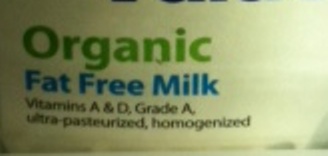Milk
It is as true in cheesemaking as it is in cooking: the quality of the ingredients can make or break the dish (or cheese in this case). You can make good cheese from ordinary homogenized and pasteurized store milk as long as it is reasonably fresh. Unless you have your own cows or have a really convenient farm you will probably need to work with regular store-bought milk. Until very recently that is what I have been using because it is pretty inexpensive and I hated to waste great raw milk on my early learning mistakes. Follow these points in choosing your milk for cheese:
1. Use milk that is really fresh. A lot of milk is shipped a long way to the store. I’m in the Dallas/Fort Worth area and see milk from Ohio, Colorado and California on the shelves in the stores. I try to buy milk from no farther away than Oklahoma. I also try to get milk that was delivered to the store that same day.
2. Avoid milk that is ultra-pasteurized for cheesemaking. Ultra-pasteurization uses unusually high temperature and kills just about any bacteria in the milk. But it also damages proteins and enzymes that are beneficial to the cheesemaking process. You may be able to make ricotta from this milk but not much else. Unfortunately almost all “organic” milk that you find is ultra-pasteurized. This gives the milk really long shelf-life but makes it poor for making cheese. You may be able to use ultra-pasteurized milk with regular pasteurized milk if at least 50% of the milk used is not ultra-pasteurized.
3. Generally stick to fresh liquid milk. Milk that has been frozen or dried may be used to make cheese but you may want to use it with 50% or more fresh milk. Processes like freezing or drying can damage the proteins in the milk in a similar fashion to ultra-pasteurization.
4. If you can find a farm selling fresh raw (i.e. unpasteurized) milk you should look into doing so. Most US states have laws and agriculture departments that can license a dairy farm to sell raw milk to the public only at the farm.
I have bought raw milk at two farms here in Texas and found the milk to be spectacular. Due to lactose sensitivity I can’t drink it but the CheeseWife™ has tasted both and declared them the best milk she ever had. I made quark with both and both were delicious. I made Gruyere cheese with one and Edam with the other and will report on them when they have aged 60 days each.

